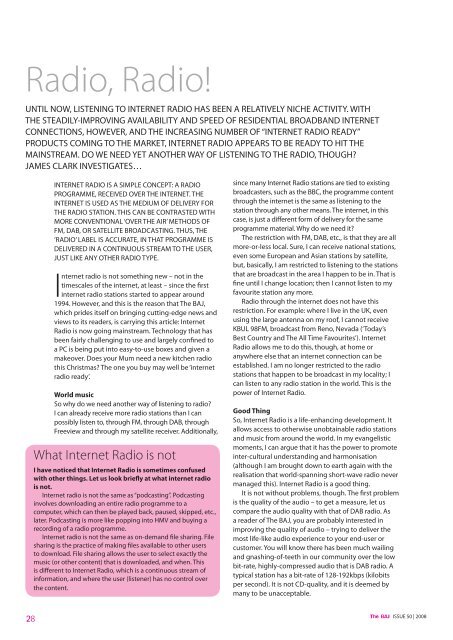You also want an ePaper? Increase the reach of your titles
YUMPU automatically turns print PDFs into web optimized ePapers that Google loves.
Radio, Radio!<br />
UNTIL NOW, LISTENING TO INTERNET RADIO HAS BEEN A RELATIVELY NICHE ACTIVITY. WITH<br />
THE STEADILY-IMPROVING AVAILABILITY AND SPEED OF RESIDENTIAL BROADBAND INTERNET<br />
CONNECTIONS, HOWEVER, AND THE INCREASING NUMBER OF “INTERNET RADIO READY”<br />
PRODUCTS COMING TO THE MARKET, INTERNET RADIO APPEARS TO BE READY TO HIT THE<br />
MAINSTREAM. DO WE NEED YET ANOTHER WAY OF LISTENING TO THE RADIO, THOUGH?<br />
JAMES CLARK INVESTIGATES…<br />
28<br />
INTERNET RADIO IS A SIMPLE CONCEPT: A RADIO<br />
PROGRAMME, RECEIVED OVER THE INTERNET. THE<br />
INTERNET IS USED AS THE MEDIUM OF DELIVERY FOR<br />
THE RADIO STATION. THIS CAN BE CONTRASTED WITH<br />
MORE CONVENTIONAL ‘OVER THE AIR’ METHODS OF<br />
FM, DAB, OR SATELLITE BROADCASTING. THUS, THE<br />
‘RADIO’ LABEL IS ACCURATE, IN THAT PROGRAMME IS<br />
DELIVERED IN A CONTINUOUS STREAM TO THE USER,<br />
JUST LIKE ANY OTHER RADIO TYPE.<br />
Internet radio is not something new – not in the<br />
timescales of the internet, at least – since the first<br />
internet radio stations started to appear around<br />
1994. However, and this is the reason that The <strong>BAJ</strong>,<br />
which prides itself on bringing cutting-edge news and<br />
views to its readers, is carrying this article: Internet<br />
Radio is now going mainstream. Technology that has<br />
been fairly challenging to use and largely confined to<br />
a PC is being put into easy-to-use boxes and given a<br />
makeover. Does your Mum need a new kitchen radio<br />
this Christmas? The one you buy may well be ‘internet<br />
radio ready’.<br />
World music<br />
So why do we need another way of listening to radio?<br />
I can already receive more radio stations than I can<br />
possibly listen to, through FM, through DAB, through<br />
Freeview and through my satellite receiver. Additionally,<br />
What Internet Radio is not<br />
I have noticed that Internet Radio is sometimes confused<br />
with other things. Let us look briefly at what internet radio<br />
is not.<br />
Internet radio is not the same as “podcasting”. Podcasting<br />
involves downloading an entire radio programme to a<br />
computer, which can then be played back, paused, skipped, etc.,<br />
later. Podcasting is more like popping into HMV and buying a<br />
recording of a radio programme.<br />
Internet radio is not the same as on-demand file sharing. File<br />
sharing is the practice of making files available to other users<br />
to download. File sharing allows the user to select exactly the<br />
music (or other content) that is downloaded, and when. This<br />
is different to Internet Radio, which is a continuous stream of<br />
information, and where the user (listener) has no control over<br />
the content.<br />
since many Internet Radio stations are tied to existing<br />
broadcasters, such as the BBC, the programme content<br />
through the internet is the same as listening to the<br />
station through any other means. The internet, in this<br />
case, is just a different form of delivery for the same<br />
programme material. Why do we need it?<br />
The restriction with FM, DAB, etc., is that they are all<br />
more-or-less local. Sure, I can receive national stations,<br />
even some European and Asian stations by satellite,<br />
but, basically, I am restricted to listening to the stations<br />
that are broadcast in the area I happen to be in. That is<br />
fine until I change location; then I cannot listen to my<br />
favourite station any more.<br />
Radio through the internet does not have this<br />
restriction. For example: where I live in the UK, even<br />
using the large antenna on my roof, I cannot receive<br />
KBUL 98FM, broadcast from Reno, Nevada (‘Today’s<br />
Best Country and The All Time Favourites’). Internet<br />
Radio allows me to do this, though, at home or<br />
anywhere else that an internet connection can be<br />
established. I am no longer restricted to the radio<br />
stations that happen to be broadcast in my locality; I<br />
can listen to any radio station in the world. This is the<br />
power of Internet Radio.<br />
Good Thing<br />
So, Internet Radio is a life-enhancing development. It<br />
allows access to otherwise unobtainable radio stations<br />
and music from around the world. In my evangelistic<br />
moments, I can argue that it has the power to promote<br />
inter-cultural understanding and harmonisation<br />
(although I am brought down to earth again with the<br />
realisation that world-spanning short-wave radio never<br />
managed this). Internet Radio is a good thing.<br />
It is not without problems, though. The first problem<br />
is the quality of the audio – to get a measure, let us<br />
compare the audio quality with that of DAB radio. As<br />
a reader of The <strong>BAJ</strong>, you are probably interested in<br />
improving the quality of audio – trying to deliver the<br />
most life-like audio experience to your end-user or<br />
customer. You will know there has been much wailing<br />
and gnashing-of-teeth in our community over the low<br />
bit-rate, highly-compressed audio that is DAB radio. A<br />
typical station has a bit-rate of 128-192kbps (kilobits<br />
per second). It is not CD-quality, and it is deemed by<br />
many to be unacceptable.<br />
The <strong>BAJ</strong> ISSUE <strong>50</strong> | 2008


